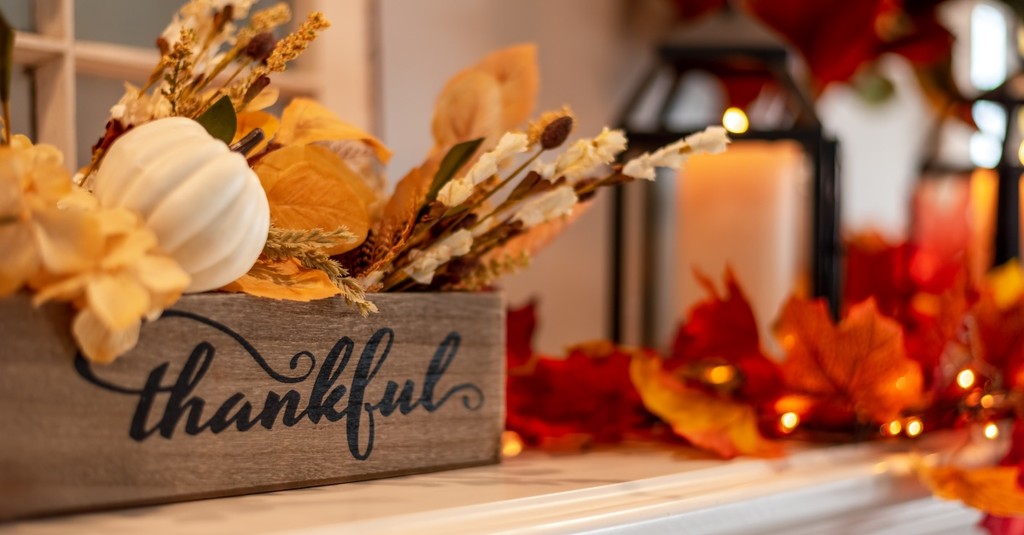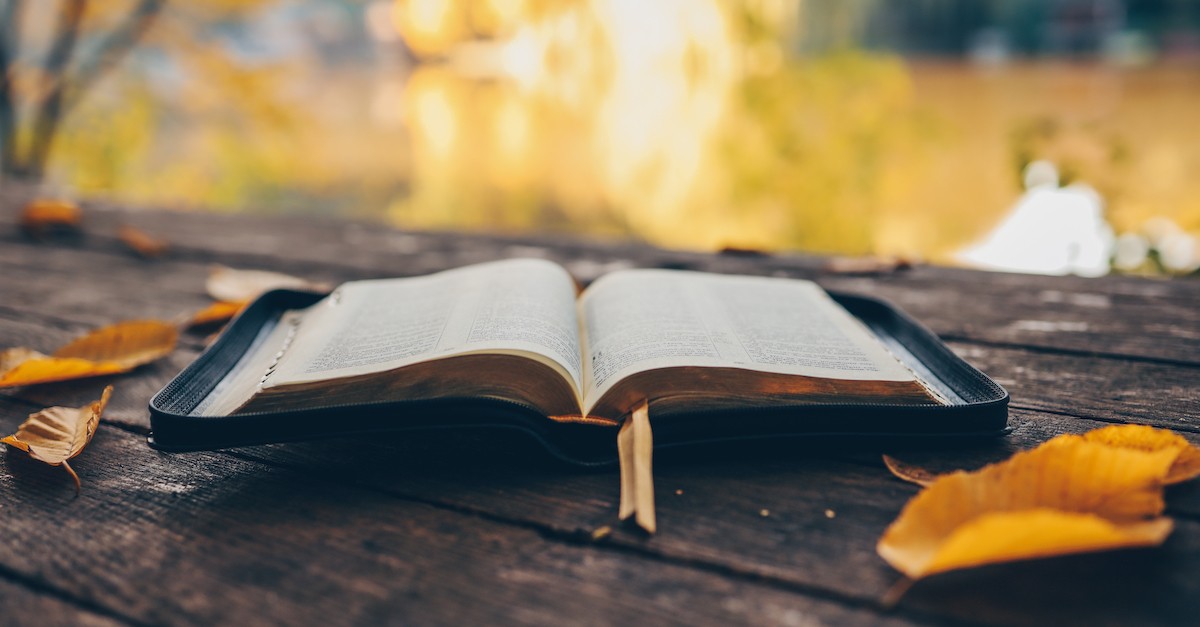
With attention fixed on organizing a great Thanksgiving dinner for loved ones, sometimes we forget to actually give thanks. Gratitude is more difficult for some than others, but it is healing in so many ways. When we find reasons to give thanks, we also find reasons for hope. And, as Christians, we have someone to thank who cares deeply for us. Scripture is filled with examples of how we can express gratitude to God. Here are ten Psalms of Thanksgiving which apply to us today.
Photo Credit: ©Getty Images/Kristen Prahl

1. Psalm 28:7
"The LORD is my strength and my shield; in him my heart trusts, and I am helped; my heart exults, and with my song I give thanks to him." - Psalm 28:7
David had cried out, “Be not deaf to me, lest, if you be silent to me, I become like those who go down to the pit.” (v.1) David Guzik explains that “In faith he gave God the title he longed for Him to fulfill: to be David’s Rock in the present season of difficulty. David said this also in hope because, at the moment, he felt God be silent to him.”
Gratitude is especially remarkable when a person is suffering but still praises God. David could not hear God, felt isolated and forgotten, yet he knew that the Lord was with him. He was inconsistent, his obedience faltering, but he knew that the Lord was not like us; he was steady and consistent. David was grateful enough to sing.
David was a strong man and a warrior king, but his gratitude helped him recognize the Lord’s trustworthy character and his own neediness. He could let his guard down in neediness and ask God: “Save your people and bless your heritage! Be their shepherd and carry them forever” (v.9). He knew he needed God to be rock and shepherd—king and Savior.
Photo Credit: ©GettyImages/Bohdan Bevz

2. Psalm 50:14
"Offer to God a sacrifice of thanksgiving, and perform your vows to the Most High." - Psalm 50:14
These are God’s words in a Psalm of Asaph about the power of God. He does not need us, but we need him. Whatever we give to God, this must be done in a humble manner. “If I were hungry, I would not tell you, for the world and its fullness are mine.” (v.12) God shows us how needy we are of his power by telling us that he does not need a thing.
Meanwhile, we need everything from God, and he gives it. We are often in trouble and often trying to handle it alone, but he invites us: “Call upon me in the day of trouble; I will deliver you, and you shall glorify me.” (v.15). Calling on him in faithfulness gives the Lord pleasure. (Hebrews 11:6) When we realize how much we need him and are willing to ask, we demonstrate humility. Our pride is sacrificed in place of gratitude and reverence, and this is what God wants.
Photo Credit: Unsplash/Greg Shield

3. Psalm 69:3
"I will praise the name of God with a song; I will magnify him with thanksgiving." - Psalm 69:3
God knows David’s enemies and how they have dishonored him. In his suffering, David laments that all he hears is reproach, never words of comfort. He cries out, “My eyes grow dim while waiting for my God” (v.1), but he still turns to God. When everyone is your enemy, and there is no one to show you compassion, He will always stand by your side.
David’s enemies are close - for God’s sake, he has “become a stranger to my brothers, an alien to my mother’s sons.” (v.8) The Lord, however, “hears the needy and does not despise his own people who are prisoners.” (v.33)
But when we struggle mightily, God’s victory and glory are magnified, and so is our recognition of God’s power if we are paying attention and humbling ourselves. Even sweeter, when we humble ourselves, we can say with David, “God will save Zion and build up the cities of Judah, and people shall dwell there and possess it.” (v.35) Notice the plural there - with gratitude comes generosity of spirit, the ability to pray for himself and others.
Related Resource: A Prayer for Hope When the Holidays Trigger Painful Memories
The holidays can remind us not only of who or what we've lost but of moments that still sting with disappointment, regret, or sadness. - Rachel Wojo is an inspirational author, speaker, and podcaster who shares faith and hope through her popular blog, RachelWojo.com. Check out her podcast, Untangling Prayer. Her latest work, Desperate Prayers: Embracing the Power of Prayer in Life's Darkest Moments (October 8, 2024), delves even deeper into prayer’s transformative role.
Photo Credit: ©iStofk/Getty Images Plus/Drazen Zigic

4. Psalm 75:1
"We give thanks, for your name is near. We recount your wondrous deeds." - Psalm 75:1
This Psalm echoes with remembered deliverance. How often do we receive an answer to prayer without marking it? We pray, “God, help me!” He does, but we forget to thank him. We even take credit where credit belongs to God only.
In Psalm 75, God rebukes the boastful and reminds his followers that “When the earth totters, and all its inhabitants, it is I who keep steady its pillars.” (v.3)
Our testimony about God is not just for us. Some versions say “declare,” and others use the word “tell,” but “recount means the same thing: do not hoard this wonderful news.
The reason we have Psalms today is that the Psalmists wrote them down. They wanted to glorify God and make him real for other people. Christians have so much to be thankful for, but if we are not sharing the Gospel through our words and actions, gratitude might not run very deep.
Photo Credit: ©GettyImages/DjelicS

5. Psalm 95:1
"Oh come, let us sing to the Lord; let us make a joyful noise to the rock of our salvation!" - Psalm 95:1
This Psalm is both a declaration and a warning. Get your heart right and stay focused on your King. If you do not, you will not have peace with God.
This Psalm reminded the Israelites of what happened to their ancestors when they failed to exalt God. Verse 8 warns, “Do not harden your hearts” and test God as their forefathers did, where they were not permitted to “enter my rest.” (v.11)
Moses had led his people to the Promised Land but could not enter because they were ungrateful and forgetful, worshiped idols, and grumbled. All of Israel had to wait outside the city for 40 years, even the few who trusted him.
Today, thanks to Christ, all believers can be sure they will enter God’s rest for eternity, but the peace - the rest - of wholeness with God right now is impossible when we stray. And we are more likely to stay on course with the Lord, obeying him and at peace, when we remember what he has done in our lives and the lives of the saints around us and before us. We give thanks when we remember, and sometimes we remember when we give thanks.
Photo Credit: ©GettyImages/Evgeniya_Semenycheva

6. Psalm 118:1
"Give thanks to the LORD, for he is good! His faithful love endures forever." - Psalm 118:1
Psalm 118 is a prophetic Psalm in which Christ is mentioned as “the stone the builders rejected” but which has now become “the cornerstone” (v.22). This reminds us that Christ was always part of God’s plan of salvation. Nothing is outside of his will. We are not accidents—and neither is the trial we are facing today.
We can confidently give thanks, knowing that God’s plans for the world and us are trustworthy because he had set them before our ancestors came into being. God’s eternal nature is highlighted in the structure of this Psalm. It begins with praise, just as all life begins and ends with God. “Give thanks to the LORD, for he is good! His faithful love endures forever.” (v.29)
Sandwiched between praise is the memory of warfare—a war going on for our souls. We feel the pain of it, but our pain is short-term in comparison to the joy of eternal salvation with God. God’s eternal nature should give us confidence, which is something to be grateful for.
Photo Credit: ©GettyImages/Polina Lebed

7. Psalm 107:1
"Has the LORD redeemed you? Then speak out! Tell others he has redeemed you from your enemies." - Psalm 107:1
Our main job is to glorify God, so with the Psalmist, we tell anyone who will listen, “Give thanks to the LORD, for he is good!” (v.1) But we get discouraged. God seems distant and forgetful. We need to hear about God’s glory. We need someone with strong faith to help us, and we will do the same tomorrow for another person who feels weak. Being part of the Body of Christ means we stir each other up. (Hebrews 10:24) When publicly thankful, we give something important to a brother or sister in Christ.
The Psalmist even describes situations where we need our brothers and sisters. We will be led astray or become homeless; we will wander, we will be hungry and thirsty. (vv4-5) Whether this is our physical or spiritual reality, we are all vulnerable and forget to thank God.
Photo Credit: ©GettyImages/Solovyova

8. Psalm 100
"Shout with joy to the LORD, all the earth! Worship the LORD with gladness." - Psalm 100
Once in a while, you meet someone who bounces on the balls of his or her feet when talking about Jesus. I once watched a pastor who could barely contain himself. He laughed, smiled, and bounced his way through the sermon. He was full of reverence paired with ecstatic joy.
I have also met Christians who behave as though God is a joyless taskmaster. They are offended by jubilance and horrified by joy. Give them lukewarm water, stale crackers, and a heavy dose of guilt; they believe they have acquitted themselves nicely in God's eyes.
Our Father is generous with joy. He exalts over us with loud singing (Zephaniah 3:17). The Bible is full of music and joy. Paul wrote in Philippians 4:4,
“Rejoice in the Lord always; again I will say, rejoice.”
He is emphatic about joy, and when we declare that our joy comes from God, this is a gift to God. When we rejoice, we tell him that we love, trust, and believe that he is good; he will do what he has said he will do. Christ is truly coming to get us, and every tear WILL be wiped away in the end. Joy is an offering of gratitude to the Lord and an example of gratitude others cannot miss.
Photo Credit: ©Getty Images/Trace Hudson

9. Psalm 106:2
"Who can utter the mighty deeds of the Lord, or declare all his praise?" - Psalm 106:2
Imagine if the Lord walked away from us just as we have walked away from him when sinned. Whereas many Psalms start with lament but become Psalms of thanksgiving, this one starts with thanksgiving and switches to exhortation: be accountable.
Own up to your sins and tell the Lord that you know you are a sinner. Tell him you want to change. Be thankful for his mighty deeds and power to make the necessary changes in our hearts.
Even though the writer declares, “Blessed are they who observe justice, who do righteousness at all times!” (v.3), we know there is no one apart from Christ capable of such goodness.
We are wicked sinners who could not have saved ourselves, so we need to confess, repent, and accept forgiveness from a loving God who longs to make us like his Son if we let him. We MUST give thanks for his mercy or risk forgetting that we need it, or else we will be on the path to Hell.
Photo Credit: ©Unsplash/Mitchell McCleary

10. Psalm 136:23-24
"It is he who remembered us in our low estate, for his steadfast love endures forever; and rescued us from our foes." - Psalm 136:23-24
Psalm 136 lists many mighty works of God, starting with creation and ending with “he who gives food to all flesh” (v.25). Perhaps this reminds you of Christ, the bread and the cup.
God made all things just “by understanding”: the heavens, the stars, and the planets (v.5). He was responsible for the plagues that led to the Exodus and splitting the Red Sea so the Israelites could walk across it.
Furthermore, this Psalm tells us why God did it. Every wondrous work of God is followed by the statement, “His steadfast love endures forever.” The One who created, destroyed, and rescued did so for love. And we are benefactors of his love. We might not experience trials to the same dramatic extent as Moses or David, but our unfathomable warrior God also became human in order to be known by us and to redeem our relationship with the Father. He gave us everything, including his own life.
There is so much to be thankful for in spite of the very real suffering of everyday living, but the Psalms remind us that suffering is not new. Our God knows us, sees us, and walks with us. We will suffer no matter what, but if we see how the Lord walks beside us and promises victory, that is reason for thanks.
Photo Credit: ©Getty Images/Wesley Davi

Originally published Friday, 20 September 2024.
